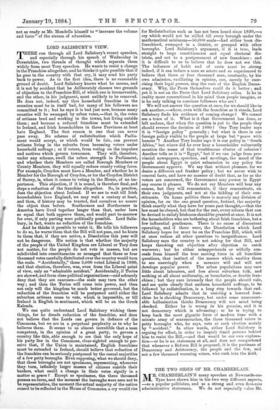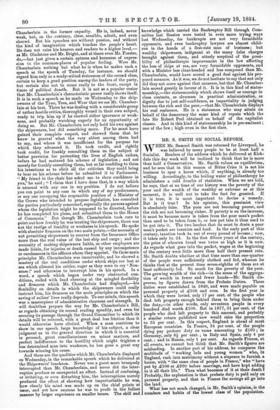THE TWO SIDES OF MR. CHAMBERLAIN.
irlt. CHAMBERLAIN'S many speeches at Newcastle-Ga- ff'. Tyne have shown him in his two very different aspects, —as a popular politician, and as a strong and even first-rate administrative statesman. We do not especially value Mr.
Chamberlain in the former capacity. He is, indeed, never weak, but, on the contrary, clear, sensible, adroit, and even shrewd. But his speeches are without passion, and without the kind of imagination which touches the people's heart. He does not raise his hearers and readers to a higher level,— as Mr. Gladstone and Mr. Bright, and at times even Mr. Forster, do,—but just gives a certain aptness and keenness of expres- sion to the common-places of popular feeling. Were Mr. Chamberlain nothing but what he is when he makes such a speech as the speech of Tuesday, for instance, we should regard him only as a ready-witted statesman of the second class, certain to keep a good position among the leaders of the party, but certain also not to come really to the front, except in times of political dearth. But it is not as a popular orator that Mr. Chamberlain's characteristic power really shows itself. It is in such a speech as he made on Wednesday to the ship- owners of the Tyne, Tees, and Wear that we see Mr. Chamber- lain at his best. There he was dealing with a considerable group of rather hostile critics, thoroughly versed in their own subject, ready to trip him up if he showed either ignorance or weak- ness, and probably watching eagerly for an opportunity of doing so. But Mr. Chamberlain not only held his own against the shipowners, but did something more. For he must have gained their complete respect, and showed them that he knew in general what the very ablest among them had to say, and where it was insufficient for the purpose for which they advanced it. He took credit, and rightly took credit, for frankly consulting them on the subject of better provision for protecting the lives of English sailors, before he had matured his scheme of legislation ; and not merely for frankly consulting them, but so far confiding to them his intentions as to elicit all the criticism they could bring to bear on his scheme before he submitted it to Parliament. "My friend in the chair has asked me to show confidence in you," he said ; "I claim that I have done that, in a way which is unusual with any one in my position. I do not believe you can point to any case in which any of my predecessors, or any one occupying the responsible position of a Minister of the Crown who intended to propose legislation, has consulted the parties particularly concerned, especially the persons against whom the legislation might be supposed to be directed, before he has completed his plans, and submitted them to the House of Commons." But though Mr. Chamberlain took care to point out how frankly he was treating the shipowners, there was not the vestige of timidity or weakness in his speech. He spoke with absolute firmness on the two main points,—the necessity of not permitting shipowners to recover from the Insurance Office more than the real value of the lost ship and cargo ; and the necessity of making shipowners liable, as other employers are made liable, for injuries or death caused by any incompetence or carelessness in the officers whom they appoint. On these main principles Mr. Chamberlain was immoveable, and he showed a mastery of the real conditions under which ships are lost at sea which silenced his critics, eager as they were to cry Non- sense l' and otherwise to interrupt him in his speech. In a word, a speech which began under very obstructed con- ditions, ended with loud cheering at the mingled flexibility and firmness which Mr. Chamberlain had displayed,—his flexibility on details in which the shipowners could really instruct him, his firmness on the main principles on which the saving of sailors' lives really depends. To our minds, this speech was a masterpiece of administrative clearness and strength. It will doubtless prepare the way for Mr. Chamberlain's Bill, as regards obtaining its second reading speedily, and even for securing its passage through the Grand Committee to which its details will be referred, with a great deal less friction than it would otherwise have elicited. When a man contrives to show in one speech large knowledge of his subject, a clear judgment as to the general direction in which it is essential to proceed, great conciliatoriness on minor matters, and perfect indifference to the hostility which might frighten a less determined man into weakness, he has gone a great way towards winning his cause.
And these are the qualities which Mr. Chamberlain displayed on Wednesday, in the remarkable speech which he delivered at the Shipowners' luncheon. Never was a guest more brusquely interrupted than Mr. Chamberlain, and never did the inter- ruption produce so unexpected an effect. Instead of confusing, or irritating, or even disturbing him, the interruptions merely produced the effect of showing how imperturbable he was, how clearly his mind was made up on the chief points at issue, and yet how anxious he was to profit in the fullest manner by larger experience on smaller issues. The skill and knowledge which carried the Bankruptcy Bill through Com- mittee last Session were tested in even more trying ways last Wednesday, for bankrupts are not very formidable opponents, and even bankruptcy lawyers are almost child- ren in the hands of a first-rate man of business ; but wealthy shipowners, indignant at the many false charges brought against them, and utterly sceptical of the possi- bility of philanthropic improvement in the law affecting the loss of ships at sea, are very formidable opponents, and with a Minister less clear-headed and less composed than Mr. Chamberlain, would have scored a good deal against his pro- posed measure. As it was, we do not hesitate to say that not only did they not score against that measure, but that Mr. Chamber- lain scored greatly in favour of it. It is in this kind of states- manship,—the statesmanship which shows itself as courage in class contests, as clearness in practical administration, as dignity due to just self-confidence, as impartiality in judging between the rich and the poor,—that Mr. Chamberlain displays his real eminence. He is a statesman who may attain on behalf of the democracy the same kind of repute which the late Sir Robert Peel obtained on behalf of the capitalist classes. And in this kind of statesmanship he is pre-eminent ; one of the few ; high even in the first class.



































 Previous page
Previous page